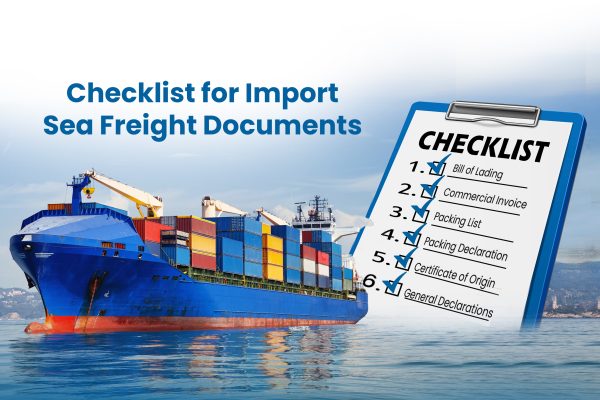Don’t look at shipping documents as being ‘just more paperwork.’ Having accurate and complete documentation underpins the smooth transit and customs clearance of your sea cargo imports. Knowing exactly which documents you need and getting them to your broker before the ship’s arrival determines how quickly your shipment is delivered to its final destination.
You do not need a licence to import goods into Australia, although you may need a permit to bring in certain items, particularly those subject to biosecurity conditions. Plant, mineral or human products need to be quarantined, inspected and treated for pests and diseases before entry and may need an import permit to clear customs.
Here is a checklist of Import Shipping Documents needed for sea cargo:
Bill of Lading
A Bill of Lading (B/L) is a contract of carriage between the shipper, carrier and consignee.
It is a legal document. A shipper can hold the B/L until they receive payment, which ensures that the consignee doesn’t take delivery of the goods without paying.
The information on the B/L must be accurate and include the following details:
– The shipper, carrier, consignee and notify party
– Ports of loading and destination
– Incoterm (shipment term) being used – these are all listed on our website
– Description of the goods including weights and dimensions
Some shipping lines are making the transition to ‘Paperless B/Ls’ and you will receive advice of these electronically, which you can send on to us. Likewise, in the case of ‘Express Release’ Bills of Lading, your supplier will usually email you a copy which you can onforward to us.
Commercial Invoice
The commercial invoice is the most important shipping document in the shipping process.
The invoice will show a full description of the products in the transaction and their value. The commercial value is the amount you are buying the products for and will determine the duties and GST payable on arrival. It should include the Incoterm so that all parties are clear on who is paying for what elements of the shipping. See the full list on our website or ask us for advice.
A proforma invoice may be issued to a consignee before the shipper completes the goods. A proforma may not demand payment but will detail the weight of the goods and transport charges and the consignee may need it for customs purposes.
Packing List
Typically, a packing list should accompany and complement your commercial invoice.
The purpose of the packing list is to outline how your shipment is packed and details the weights and dimensions of each item/pallet/crate. The packing list is particularly useful if your goods are directed for inspection and Customs can use it to locate any items that they want to look at. The faster an inspection takes place, the less it costs the consignee – so accurate documentation is important.
Packing Declaration
Packing declarations are different from packing lists. Required for sea freight shipments coming into Australia, this document declares the type of packing material used in the goods.
It’s not just the goods coming into our country that pose a biosecurity risk – the packaging around the goods can be even more hazardous. Packaging materials such as straw, bamboo, peat, hay, chaff and used-cardboard from fruit and vegetable boxes are not permitted. If timber packaging is used, it must be treated prior to import.
Certificate of Origin
The Certificate of Origin (CoO) is a declaration that evidences the country where goods were grown, produced or manufactured. Not all imports will require this document.
If the country of export has a Free Trade Agreement (FTA) with Australia, you can reduce duty charges when you have a CoO. The list includes the USA and ASEAN countries. If you have been paying duties on a product imported from a country with an FTA with Australia, you have up to three years to claim rebates using the certificate of origin. We can assist you with this – check with us for a list of FTA countries.
General Declarations – Asbestos and Fumigation
Once you check off the documents above, the final step is to determine if the product you are importing will require any further declarations, which are usually based on the material the goods are made of.
Documents such as an asbestos declaration, fumigation treatment or phytosanitary certificate may be required. Prior to shipping, check with us to see if your product is affected by any restrictions.
Appropriate due diligence must be conducted if your product is at risk of containing asbestos. Once satisfied it is clear, an authorised representative must sign and declare products contain “No Asbestos.”
A Fumigation Certificate declares that all wooden packaging used in sea freight shipping has been fumigated. This document will include:
– Purpose of treatment
– Temperature range used
– Chemicals used and their concentration
As always, we remind you to talk to us here at Colless Young with any concerns you may have at the time you place your order, that is, before it is loaded on board a vessel bound for Australia.
We can advise you about specific products and materials from all overseas ports of origin. Contact Andrew, email enq@collessyoung.com.au Tel: +61 7 3890 0800.

